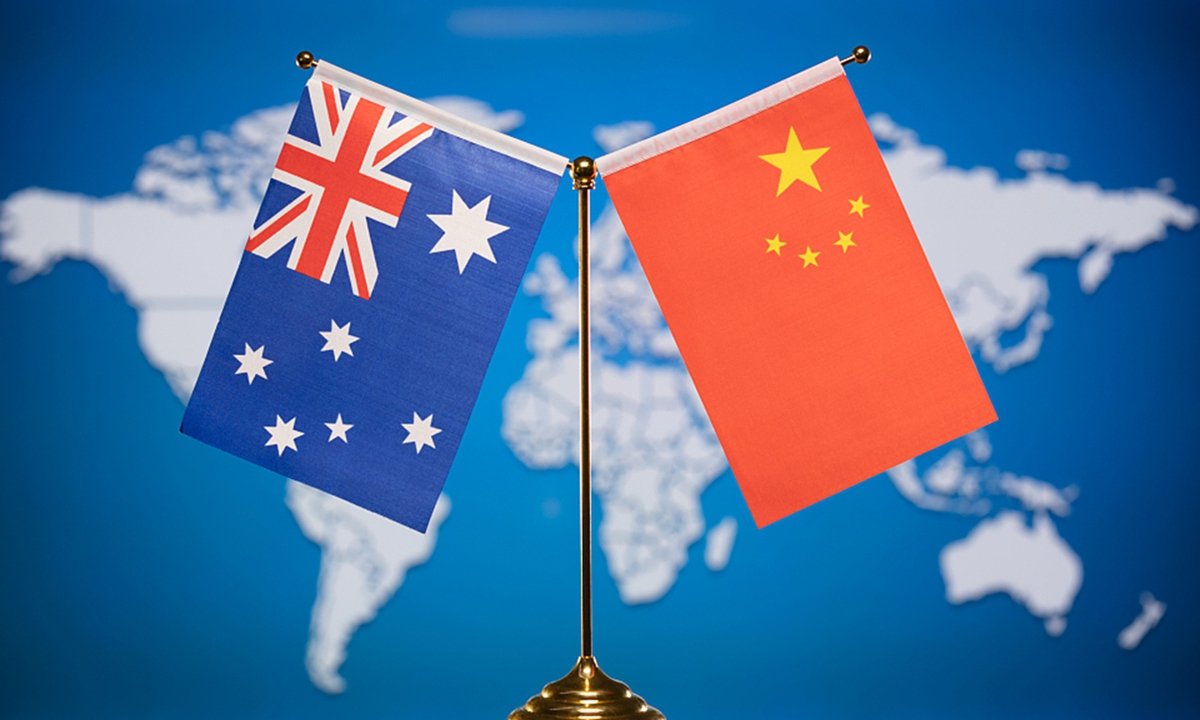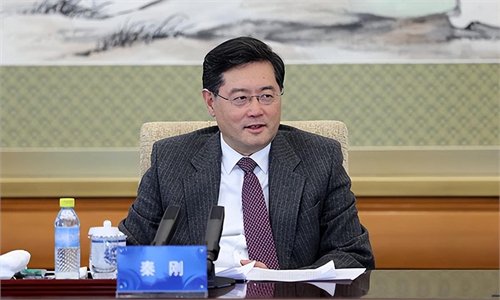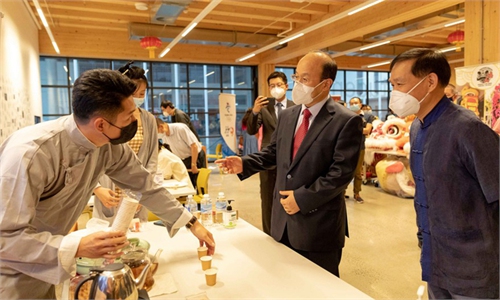Premier Li’s ‘fruitful’ visit to Australia paves way for further improvement in bilateral ties

China-Australia Photo: VCG
Chinese Premier Li Qiang on Tuesday called on businesses from China and Australia to continue to deepen cooperation in traditional fields and expand cooperation in new areas such as artificial intelligence, quantum technology and life science, and stressed the importance of bilateral cooperation in stabilizing industrial and supply chains, while attending a CEO roundtable in Perth, Australia as he was wrapping up a high-stakes visit to the country.Li's four-day trip to Australia, the first by a Chinese premier to the country in seven years, was fruitful, as both sides reopened various channels for dialogue, especially in the economic and trade arena, and started new initiatives to boost bilateral exchanges, including people-to-people exchanges, paving the way for further improvement in bilateral ties, experts noted.
As the business communities of the two countries play a vital role in stable bilateral relations and as there is a very strong desire among businesses from both countries for collaboration, continuous efforts are needed to facilitate business cooperation, experts said, urging the Australian side to provide a fair, non-discriminatory environment for Chinese businesses and avoid external disruptions.
China's concrete efforts to open up its market for Australian businesses and make it much easier for Australian citizens to visit China underscored its sincerity as well as its responsible attitude as a major country to promote not only win-win bilateral cooperation with Australia, but also peace and development in the broader Asia-Pacific Region, despite certain country's efforts to stir up tension, experts noted.
On Tuesday morning local time, Li and Australian Prime Minister Anthony Albanese attended the seventh China-Australia CEO Roundtable in Perth, where the Chinese premier highlighted the positive momentum of stable improvement in bilateral ties and the vast potential for China-Australia cooperation, according to the Xinhua News Agency.
Bilateral cooperation also enjoys broad prospects and is an important force for stabilizing industrial and supply chains and boosting economic growth, Li said.
It is hoped that entrepreneurs from both countries will continue to deepen cooperation in traditional fields, strive to expand new areas of cooperation, and actively deploy future industries such as AI, quantum technology and life sciences, so as to make the pie of win-win cooperation between China and Australia even bigger, Li said.
The Chinese premier also said China is mulling major measures to further comprehensively deepen reforms, steadily expand institutional opening-up, and its business environment will get better and better, urging businesses to seize the opportunity and strive for greater development and fruitful cooperation.
For his part, Albanese said that Australia-China relations are stabilizing and improving, noting the business communities of the two countries are enthusiastic about cooperation. Australia stands ready to strengthen cooperation with China in economy, trade, mineral resources, innovation and other fields, according to Xinhua.
The CEO Roundtable was attended by 14 senior business leaders from each country. Australian business leaders at the meeting include Bran Black, chief executive of the Business Council of Australia, Andrew Forrest, chairman of Fortescue, and Kellie Parker, chief executive of Rio Tinto. Chinese business leaders in attendance include Zhao Huan, chairman and executive director of China Development Bank, Ge Haijiao, chairman of Bank of China, and Jian Anqi, chair of Tianqi Lithium Industries, according to an official statement.
"While it is for governments to set the terms of the trading relationship, it is the role of the business community to bring those relationships to life and look for greater economic and trade opportunities," Black, the Australia chair of the roundtable, was quoted by the statement as saying. "What happens in these Roundtable discussions helps set the tone for business collaboration across our two economies."
Business collaboration is vital for not only economic and trade cooperation between China and Australia but also the stability of bilateral ties, given the strong desire from the business communities of both countries to pursue win-win cooperation, Chinese experts noted.
"Cooperation between Chinese and Australian businesses is an important part of the bilateral relationship. Since the establishment of diplomatic relations, exchanges between enterprises of the two countries, especially among entrepreneurs, have significantly promoted the development of bilateral relations," Yu Lei, a professor at the Department of International Politics and Economics at Shandong University, told the Global Times on Tuesday.
Before 2017, Chinese businesses' investments in Australia flourished, but after the previous Australian administration politicized bilateral ties and intervened in bilateral trade and investment cooperation, Chinese investments plunged, Yu noted, adding that while Australian firms' investments in China were affected to a degree, the total figure remained stable thanks to China's openness.
Given the strong aspiration for both sides to stabilize ties and expand cooperation, further efforts should be taken to remove disruptive factors to business collaboration, experts said.
"We need to create a stable environment for companies to ensure that they do not suffer too much disruption in the process of cooperation," Zhou Mi, a senior research fellow at the Chinese Academy of International Trade and Economic Cooperation, told the Global Times on Tuesday, urging Australia to maintain policy continuity, abide by international rules, and avoid politicization of economic issues.
While co-chairing the 9th China-Australia Annual Leaders' Meeting with Albanese in Canberra on Monday, Li expressed the hope that Australia will foster a fair, just and non-discriminatory environment for Chinese businesses, and provide more convenience for cross-border travel between the two countries, according to a statement from the Chinese Foreign Ministry.
At the meeting, the two sides announced that they will hold the 10th meeting of the Joint Science and Technology Commission, the 8th China-Australia High-Level Dialogue, and the 8th China-Australia Ministerial Dialogue on Climate Change in Australia within this year. China will include Australia in its unilateral visa waiver program, and the two sides have agreed to provide each other with reciprocal access to multiple-entry visas of up to three to five years' duration for tourism, business, and visiting family members.
Experts said the slew of results underscored that the Chinese premier's trip to Australia was fruitful and will pave the way for further improvement in bilateral ties.
Chen Hong, director of the Australian Studies Center at East China Normal University, said the resumption of multiple communication channels, including the strategic economic dialogue, means that previously closed economic dialogue channels will reopen, which is great news for bilateral ties.
"The high-level dialogues will further bring the bilateral relationship back to the normal track, paving the way for the recovery in trade and investment cooperation," Chen told the Global Times, noting that more good news is expected to emerge as the two countries will likely remove hurdles and boost cooperation.
After wrapping up his visit in Australia, Li will visit Malaysia, the last stop of his three-nation trip, where the two sides are expected to celebrate the 50th anniversary of bilateral relations and discuss ways to promote deeper ties and greater cooperation. Before arriving in Australia, Li visited New Zealand, where the two countries agreed to further expand cooperation and develop bilateral ties, which has been hailed as a model of cooperation between countries with different social systems.
Experts said that in stark contrast to certain country's attempt to stir up tension in the Asia-Pacific region by pitting regional countries against China, China has shown its status as a responsible major country in focusing on promoting peace, development and win-win cooperation with regional countries.



